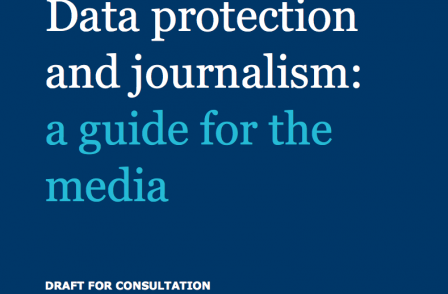
It’s puzzled me for years why nobody has tried to weaken journalists’ rights under the Data Protection Act.
If you diminish them, you get media censorship made-simple. The perfect solution for any government – national or EU – that wants to muzzle the free press.
But it would never happen, would it? Well, yes. The Google "take-down" ruling shows us the future.
And so do the Information Commissioner’s draft media guidelines, which were originally due to be finalised around now. Thankfully, they have been delayed following media outcry.
The guidelines (on how journalists should deal with other people's data) make scary reading.
They say: "The default setting is not publication. You must have a justification. This is a balancing act – if there is a serious privacy intrusion or risk of harm, there will need to be a significant public interest at stake."
And they add that sensitive personal data about people involved in wrong-doing and incompetence can only be published if there is substantial public interest.
Note those words: Substantial and significant. They go further than the current PCC Code and privacy laws.
OK, so the media will still have the journalistic exemption under Data Protection Act.
This means that if someone asks a newspaper, magazine or website to hand over, or delete articles, notes and details about them, the publisher can say no.
But the Google ruling means people will be more likely to appeal to the Information Commissioner. This will lead to long, expensive legal battles. Do publishers have the budget, time and the staff to deal with appeals? Will they bother to fight – or just press the delete button, to save time and money?
If that’s not enough, the guidelines also say journalist will, in some circumstances, have to:
- warn public figures at the beginning of an investigation
- destroy notes, records and telephone numbers in some cases.
And then there’s a European Parliament’s plan to remove prosecution immunity for journalists who handle sensitive information. This is expected to take force in 2016. That will mean even more dawn knocks from the Met Police’s finest who are currently investigating journalists.
What’s left of our free press is already on an irreversible creep towards a Soviet-style state controlled press. New data protection rules will accelerate that creep into a run.
But it’s not too late to stop them.
Cleland Thom runs distance learning courses in internet law
Information Christopher Graham has responded to this piece:
If we’re going to have suggestions of “an irreversible creep towards a Soviet-style state controlled press”, then we need to be sure of the facts. And I don’t think this article is.
First of all, there’s no diminishing of journalists’ rights under the Data Protection Act. That law was agreed by Parliament 16 years ago, and the Information Commissioner has no power to change it.
My office is drafting a guidance document to explain that law, as we were told to do by the Leveson inquiry. We were asked because we regulate that law, and because we’re independent – we are not a part of government.
We want it to be a practical document for journalists, and that is why we arranged two (very well attended) sessions with journalists and put the draft guidance out for consultation
The specific aspects Cleland highlights – the need to justify serious privacy intrusion with significant public interest, for instance – are not new interpretations of the law (and indeed will be no surprise to anyone who’s dealt with European human rights legislation).
That same law has a specific exemption for journalistic use of personal data. When publication is in the public interest, the press will not need to warn public figures at the start of an investigation. You can rest assured that when the guidance is published in September, we won't be asking journalists to drop an MP a line before investigating his or her expenses claims.
This guidance simply explains existing laws. And while there’s no doubt that a free press is a key part of democracy, so is obeying the law of the land.
Email pged@pressgazette.co.uk to point out mistakes, provide story tips or send in a letter for publication on our "Letters Page" blog
